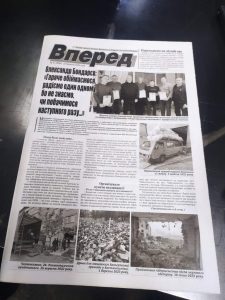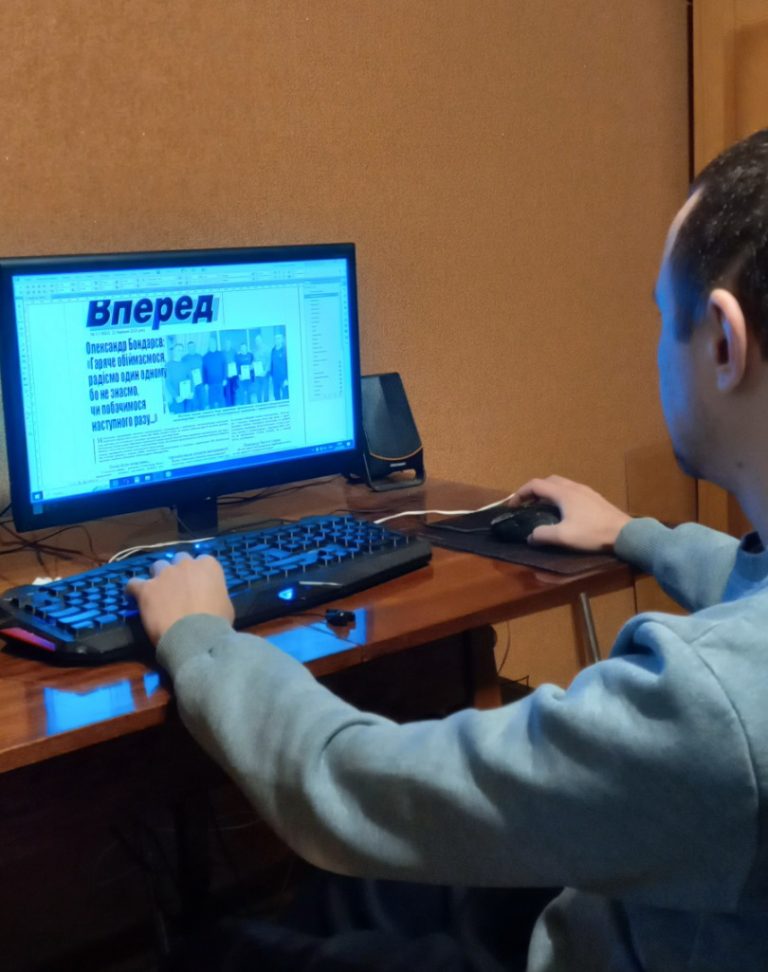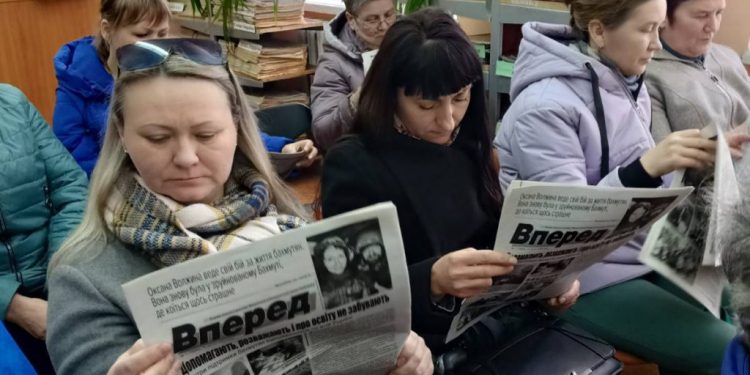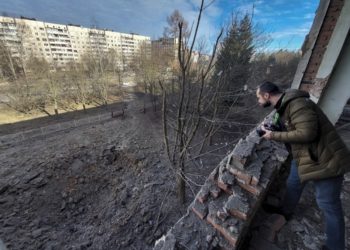“When explosions woke us up on February 24, 2022, we were not even scared as we live on the demarcation line and have been used to them since 2014. The awareness that something terrible was happening appeared only when friends and relatives from Dnipro, Kyiv, Odesa, Kharkiv, and Sumy Regions started calling, saying that the same thing was happening where they were,” recalls Svitlana Ovcharenko, the editor-in-chief of the Vpered [Forward] newspaper from frontline Bakhmut, Donetsk Region. Despite the terrible fighting in and around the city and the almost complete destruction of houses, the publication, thanks to the support of the Swiss non-profit organization, Foundation Hirondelle, and other financial donors, has a certain economic stability.
The last pre-war issue of the newspaper was published on February 23. The next one did not come out because the road from Kramatorsk (where the printing house is located) to Bakhmut began to be shelled. It soon became dangerous in Bakhmut, and newspaper journalists left the city.
The newsroom maintained the website but did not abandon its hopes and dreams for the revival of the publication and the newspaper, at least remotely.
 “One day, the President of the National Union of Journalists of Ukraine (NUJU), Sergiy Tomilenko, offered us the help of international donors to publish the newspaper’s first issue after the beginning of the war,” says Svitlana Ovcharenko. “We clung on to this idea. After all, in Bakhmut, in conditions of lack of communication, people were left in some information vacuum. The first issue, after a months-long break, dated November 4, was created by all of Ukraine, as our employees are now residing in Kyiv, Odesa, Sumy Region, and Dnipro. The issue was distributed in Bakhmut with the support of the city authorities and local volunteers via shops, with humanitarian aid, and generally wherever possible.”
“One day, the President of the National Union of Journalists of Ukraine (NUJU), Sergiy Tomilenko, offered us the help of international donors to publish the newspaper’s first issue after the beginning of the war,” says Svitlana Ovcharenko. “We clung on to this idea. After all, in Bakhmut, in conditions of lack of communication, people were left in some information vacuum. The first issue, after a months-long break, dated November 4, was created by all of Ukraine, as our employees are now residing in Kyiv, Odesa, Sumy Region, and Dnipro. The issue was distributed in Bakhmut with the support of the city authorities and local volunteers via shops, with humanitarian aid, and generally wherever possible.”
People’s reaction to the revived newspaper was unexpectedly lively. The editors called and said: “You have no idea what it means to us; we read and cried, passed the newspaper from one to another. This is such a ray of hope in the hell we’re in now!” And one Bakhmut resident talked about his feelings with such enthusiasm that the editor herself burst into tears. The man said that probably 102 years ago when his great-grandparents took the newspaper’s first issue, they probably had the same feelings. Because both back then and now in Bakhmut, there is nowhere to get accurate information except for the newspaper…
With time, the situation in the city, unfortunately, worsened, and the newspaper began to be distributed in the only invincibility center that was still there.
The newspaper issues contain articles about the work of Bakhmut municipal services during the war, the search for the missing, and the burial of those who died and were killed in the city… The newspaper also covers the information about the evacuation, which is being carried out only by people in uniform, particularly police officers representatives of the White Angels division.
“One military woman involved in evacuation told us that when she took the children out, they were indescribably happy when the sun set: these little ones, hiding in the basement, had been unable to see sunlight for several months,” the journalist says. “And the youngest child who was evacuated from Bakhmut is only one and a half months old. She was born there, in the basement… It is very difficult to understand the people who remain among the ruins. After all, any conditions in a peaceful city are better than being under fire in a basement.”

Svitlana Ovcharenko. Photo: Military Journalist Day awarding ceremony (2021)
According to Svitlana Ovcharenko, as of the end of March 2023, about 2,000 out of 80,000 people were still staying in the city. The rest left for safer places in our country and abroad. Therefore, part of the circulation of the Vpered newspaper goes to so-called Bakhmut hubs (centers) throughout Ukraine.
“We work for the people, for the people of Bakhmut, not the territory,” explains the editor. “Bakhmut hubs unite compatriots forced to leave their hometown and go to Dnipro, Kyiv, Kostiantynivka, Zhovti Vody, Kryvyi Rih, Odesa….”
According to Svitlana Ovcharenko, she receives many appeals from places without Bakhmut hubs and where the newspaper does not reach.
“There were letters from Poltava, from cities and villages in different parts of Ukraine, requesting to send copies of the newspaper. One woman wrote that the newspaper is something she is used to…” says Svitlana Ovcharenko. “This woman accidentally got a copy of our newspaper in her hands and, according to her, her ‘little heart barely held from stopping.’ She asked if there was any way she could subscribe to Vpered. I replied that we do not send the newspaper to her town. Then she asked… to send her the newspaper via Nova Poshta private postal company! She did not even fret about paying for the delivery of each copy at UAH 55… You can imagine how touching it is for me!”

Thanks to the NUJU‘s support and the help of philanthropists, the Vpered newspaper is published regularly, twice a month; the first issue contained four pages, and the second eight. The newspaper is currently printed in Kyiv.
“Great thanks to Japanese philanthropists, the organizations GREEN COOP and the Japan Foundation of Future Generations, the international charitable fund Academy of Ukrainian Press, the Swiss non-profit organization Foundation Hirondelle, the International Institute for Regional Media and Information (IRMI, Ukraine), and the Ternopil Press Club. Only thanks to the donors does our newspaper has the opportunity to reach the reader,” emphasizes Svitlana Ovcharenko.

This story about the media was created by the NUJU as part of the Increasing Ukrainian Media Sustainability project financed by Swiss Solidarity and implemented with the support of the Swiss non-profit organization Fondation Hirondelle and the IRMI. Fondation Hirondelle and the IRMI are implementing a project of institutional support for editorial offices of Ukrainian media in the east, north, and south of our country, with an emphasis on the local press. They have also launched a 10-month assistance program for 18 media.

 THE NATIONAL UNION OF
JOURNALISTS OF UKRAINE
THE NATIONAL UNION OF
JOURNALISTS OF UKRAINE
















Discussion about this post